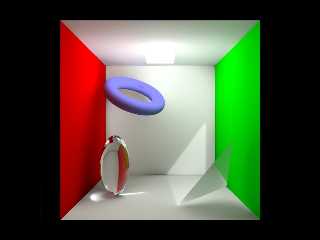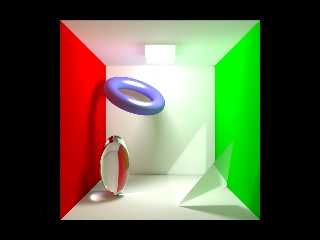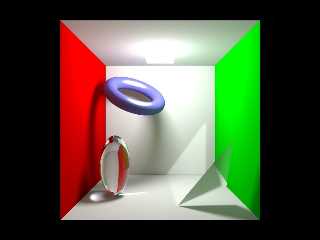|
 |
I've had a course in Computer-Graphics this Semester, and
got all excited about all the kind of approaches and ideas
that there are in order to render an image.
Anyways, the last session was about global illumination,
local vs global lighting techniques etc. This got me started
in understanding the technique of POV-Ray in detail...
The basic idea: Create several passes to generate the
different effects. So, one pass for gathering detailed and
blotchy radiosity data. This is later loaded and smoothened
by using a higher error_bound when loading as compared
to when saving.
Another pass for gathering the photons. Since these stay
unaffected of everything all the time when loaded, I could
gather photons in one pass, and load them, even without
the lightsource, a special criteria when combining pure
radiosity lighting with photons.
So, I've just made successive experiments: pure radiosity,
with no lightsource. Then, photons (since POV's radiosity
doesn't do light reflection/refraction very detailed), but these
were loaded into the radiosity scene, no lightsource present.
Finally, lightsource AND photons. For testing purposes,
I've sometimes calculated the radiosity samples with photons,
sometimes without, to look for differences.
Anyways, I've noticed that photons DO make a difference,
but its very small, but it DOES take longer to generate the
radiosity data. So unless there's heavy "photonizing", its
not really needed.
Additionally, it might be of interest to know that using
actual lightsources gives sharper shadows (though using
area-lights to get soft shadows is a must for realistic lighting,
somewhat paradox). BUT, it must be said that shadows
produced by pure radiosity lighting are VERY soft.
Lightsources also generate specular highlights, which are
hard to come by with pure rad-lighting. Using reflection
values with high exponents does the job, but slows down
the entire raytracing of the final pass (should be switched
off when gathering radiosity data).
I just thought I'd share these few images. I've got some dozens
more (most of em in 320x240) and will likely create a new
page on my website which'll cover the experiments and obtained
results.
Also note that outdoor scenes will most likely require different
setups, but I've found this very entertaining and educating. Expect
some of my next images to be Radiosity-Filled. :-)
Regards,
Tim
--
Tim Nikias v2.0
Homepage: http://www.digitaltwilight.de/no_lights
---
Outgoing mail is certified Virus Free.
Checked by AVG anti-virus system (http://www.grisoft.com).
Version: 6.0.495 / Virus Database: 294 - Release Date: 30.06.2003
Post a reply to this message
Attachments:
Download '1_rad_r2b1p1_largeAA.jpg' (24 KB)
Download '3_rad_r2b1p1_largeAA.jpg' (26 KB)
Download '4_rad_r2b2p1_g00_largeAA.jpg' (25 KB)
Preview of image '1_rad_r2b1p1_largeAA.jpg'

Preview of image '3_rad_r2b1p1_largeAA.jpg'

Preview of image '4_rad_r2b2p1_g00_largeAA.jpg'

|
 |




![]()